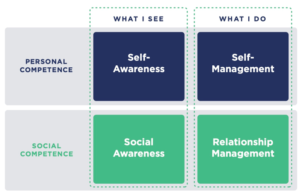
The problem with change might be simpler than we tend to make it out to be. We often talk about change as an obstacle we must overcome. However, you’ve also heard it many times: change is constant. If we take a moment to fully absorb this truism, we’ll see that change is neither exceptional nor exclusive, but rather, it is ubiquitous and inclusive.
If change is constant, why do we treat it as something that occasionally happens? Take birthdays. Each year we celebrate getting older on the exact calendar day we were born, but we of course don’t get older only on that day, we age every day, all the time. This means that right now, in this very moment you are the youngest you will be for the rest of your life. Consider how great that is! Whereas one might fret getting older, another might rejoice that in this exact moment (while reading this) you are young – in fact, as young as ever! Perspective is a powerful thing because influences how we act toward what’s being perceived, and this is how we can think about change. From the perspective of emotional intelligence, change is life itself.
Emotional Intelligence and Change
If we treat change as something unique, then we’re likely to only apply change management skills when conspicuous indicators of change appear at work and in life – a graduation, a job offer, an organizational restructure, a marriage proposal, a positive pregnancy test, or any of the countless ways change abruptly surfaces in our lives. However, if we see change as constant, then the skills associated with managing ourselves and our relationships in the face of change are applicable on a more regular basis as life unfolds.
If we take a more inclusive approach to the idea of change — and truly grasp its constant nature – then we can see the direct impact our emotional intelligence has on our ability to be effective while change occurs within us and around us. Emotional intelligence skills help us successfully navigate change in the same way they help us to be more effective at work and in life. What’s more, emotional intelligence can help you not only mange change, but also to raise your awareness of how you and others typically think and behave when confronted with something new and unfamiliar. Unfortunately, the idea of Life Management doesn’t make the same impression as Change Management does because the latter seems to invoke something precise, while the former is admittedly vague. But think about it: if change is perpetual, we are best served by handling it with foundational skills that we’re constantly working on and applying – skills that help us be more agile, resilient, communicate better, make better decisions, and collaborate. These are just some of the results of working on your emotional intelligence.
From the perspective of emotional intelligence, change is not a problem to be solved, but a mindset to manage. Instead of a change management model that we can apply in moments that throw us off our routines and increase our stress levels, think of your EQ as a life management model that includes change awareness and change management – a model that can be applied across the many roles we play in life. Change management models are essentially about how to deal with the unknown because life is unpredictable. These models are designed to increase our awareness, to try to recognize the unknown, and move through the change swiftly and smoothly. These models are, in other words, founded on emotional intelligence skills. We know that the way to gain proficiency in any skill is to practice habitually, over time. So why would we only occasionally practice and apply skills to guide us effectively through change if it is constantly occurring?
An emotionally intelligent model for coping with (and thriving through) change focuses on building core personal and social competencies, which are the most vulnerable to impact when large change does occur. When the COVID-19 pandemic hit, for example, the most consequential change was not the virus itself, but it was how the virus impacted us and those around us – from wearing masks in public, to working remotely, to teaching our kids at home, to grieving over the loss of loved ones. At the heart of the change problem is how we feel about what is going on. This is what gets in our way the most, not the change itself. Emotions, in other words, are not tangential but central to why change can be a problem for us. Here we can note that an emotionally intelligent change model is geared toward vertical learning, or a shift in mindset wherein we can appropriately integrate information, rather than horizontal learning, or retaining different and unique types of information – wherein we might erroneously place emotional intelligence over here in one bucket and change management over there in another.
The Emotional intelligence Skills Model: A Framework for Change
Emotional intelligence is a framework of four core skills that compose a foundation on which we can recognize and understand the many forms change takes in our lives. Emotional intelligence heightens our awareness of how change impacts us and those around us so we can have a clearer understanding of what we can do about it. This is because emotional intelligence is your ability to recognize and understand emotions, and it’s your skill at using this awareness to manage yourself and your relationships with others. Your EQ is made up of four core skills: self-awareness, self-management, social awareness, and relationship management.

The goal of EQ development is to be as effective as we possibly can be in any given situation, in any given relationship at work and in life. This is not easy. The good news is, we’re not striving for perfection, but rather to formulate behavioral habits that make our work more productive, our lives smoother, and our relationships stronger. EQ skills help us identify how we feel about an unknown future, how to cope with it, and how to manage ourselves and our relationships when confronted by the conspicuous signs of change. These fundamental skills also help us be effective even when we feel things are momentarily stable (i.e., moments when change occurs more gradually, or subtly).
If we continue to treat change as sporadic and occasional, the skills that can help us to adapt and to cope will remain dormant and can atrophy overtime like unused muscles. Be careful here because your emotional intelligence, like any other skill that gets rusty without practice, might not be as sharp as possible when you need it most. Keep the learning and development going even in times when your life and work might feel steadier and more predictable.
Keep in mind, change is constant, and so too must be our emotional intelligence development. In this way, our emotional intelligence model – consisting of self-awareness, self-management, social awareness, and relationship management skills – offers an inclusive take on how we can recognize, understand, and manage change, all while maintaining a high-level of effectiveness at work and in life.
What You Can Do: Emotional Intelligence Strategies
Emotional intelligence strategies offer simple, actionable ways of sharpening our personal and social competencies. To illustrate, let’s look at just one strategy from each of the four core skill areas and highlight its impact on our ability to recognize, understand and manage change.
- Self-Awareness Strategy: Visit Your Values. Your values are what remain more constant and stable while everything else might seem to be changing around you. Check in with yourself and think intentionally about how you want to live. This reveals what you value, and these values can anchor you in otherwise choppy, volatile seas. See if you can identify how your values appear in your daily life, and if they don’t, consider what you can do to make sure your thoughts and actions align with your values. This strategy can also give you the opportunity to clarify what you can control and what you cannot. This can be a powerful awareness tool that gives you poise and peace, rather than the typically high levels of stress and erratic behaviors associated with being preoccupied over what we can’t control.
- Self-Management Strategy: Accept that Change is Right Around the Corner. If we are blindsided by change, it tends to have more of an impact on us. While we will always be faced with unexpected challenges (and triumphs) in life, we can mitigate the surprises by accepting and acknowledging that change is just around the corner. Spend some time to think through possible changes on the horizon. Be intentional about it and even make a list of possible changes that may occur in the next month. How might you prepare? What actions might you take? The more open we are to change, the more prepared we can be.
- Social Awareness Strategy: Live in the Moment. If you find yourself mentally drifting away during a conversation or a meeting, try to bring yourself back to the moment at hand. The more present you can be in the moment, the more you will be able to spot the signs of change as they surface. To live in the moment, take careful note of the people around you, what they say, how they move, and how they experience or react to you. Also take note of the broader environment, both culturally and materially. The more data you can take in about the moment itself, the better. This will help you more accurately anticipate what is to come in the immediate future.
- Relationship Management Strategy: Build Trust. Building trust is central to manage relationships and to be effective at work and in life. Communicate openly and be willing to share information about yourself. Try to be consistent in your words, actions, and behavior over time and follow through on commitments you make. If you say you will do something, do it. Others will model this, and trust can build mutually in your relationships. The more you can build trust with others, the more support you will feel in coping effectively with change. Like your values, relationships built on trust can be more predictable, sure things, and serve as anchors of stability in the face of change.
From Insights to Action
Visit About EQ for more information on emotional intelligence and how to manage change.
By TalentSmartEQ Director of Training, Joshua Rosenthal